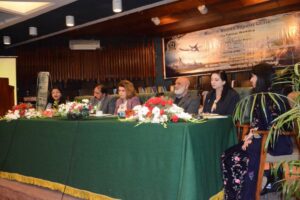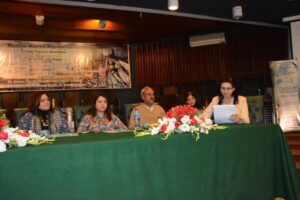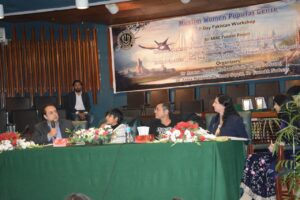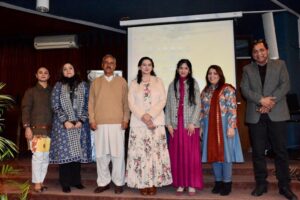DEPARTMENT OF ENGLISH ORGANIZES A TWO-DAY PAKISTAN WORKSHOP ON MUSLIM WOMEN POPULAR GENRE
 The Department of English successfully held a two-day Pakistan Workshop as part of the UK’s Arts and Humanities Research Council’s ‘Muslim Women Popular Genre’ project that has been won by Dr. Aroosa Kanwal. A unique project in every sense of the term, this project aims at excavating the forgotten, ignored, erased, unread, unheard, works by Muslim women in general and Pakistani women in particular, who are creating a diverse array of hitherto unacknowledged fiction in not only Urdu and English but in the diverse languages that constitute Pakistan’s rich cultural and linguistic spectrum. The aim of this project is specifically to identify Pakistani women experimenting in the speculative genre and to develop a strong critical discourse around it.
The Department of English successfully held a two-day Pakistan Workshop as part of the UK’s Arts and Humanities Research Council’s ‘Muslim Women Popular Genre’ project that has been won by Dr. Aroosa Kanwal. A unique project in every sense of the term, this project aims at excavating the forgotten, ignored, erased, unread, unheard, works by Muslim women in general and Pakistani women in particular, who are creating a diverse array of hitherto unacknowledged fiction in not only Urdu and English but in the diverse languages that constitute Pakistan’s rich cultural and linguistic spectrum. The aim of this project is specifically to identify Pakistani women experimenting in the speculative genre and to develop a strong critical discourse around it.
 In this two-day workshop a rich array of key note speeches, talks and panel sessions was arranged not merely by Pakistani authors dabbling in the speculative genre but also with critics and scholars, both based in Pakistan and abroad. The first session was titled ‘New Market, New Readers: The Scope for Pakistani Speculative Literature’. The expert was Professor Graeme Harper who is Dean at The Honors College Oakland University. He has a doctorate in Creative arts and in Philosophy from the University of technology, Sydney and the University of East Anglia respectively. He has a rich global experience in various academic roles across the UK, Australia and the USA. His talk titled “Creative Writing as Global Exchange: Women Writing Pakistani Popular Fiction” covered the scope of Pakistani Speculative Fiction in terms of its international receptivity in non-Pakistani cultures. In terms of its being a unique form of Creative Writing, Professor Harper emphasised that through its ability to develop empathy that cross-cultural boundaries, Pakistani Speculative Fiction by women writers has a rich future ahead.
In this two-day workshop a rich array of key note speeches, talks and panel sessions was arranged not merely by Pakistani authors dabbling in the speculative genre but also with critics and scholars, both based in Pakistan and abroad. The first session was titled ‘New Market, New Readers: The Scope for Pakistani Speculative Literature’. The expert was Professor Graeme Harper who is Dean at The Honors College Oakland University. He has a doctorate in Creative arts and in Philosophy from the University of technology, Sydney and the University of East Anglia respectively. He has a rich global experience in various academic roles across the UK, Australia and the USA. His talk titled “Creative Writing as Global Exchange: Women Writing Pakistani Popular Fiction” covered the scope of Pakistani Speculative Fiction in terms of its international receptivity in non-Pakistani cultures. In terms of its being a unique form of Creative Writing, Professor Harper emphasised that through its ability to develop empathy that cross-cultural boundaries, Pakistani Speculative Fiction by women writers has a rich future ahead.
The second session of the first day was titled ‘Politics of Marginalization of Literatures in Local Languages’. In this bilingual session, the panellists Ms. Farheen Khalid, Ms. Fatima Usman, Ms. Safia Shahid & Mr. Shoaib Khaliq foregrounded the reasons why Pakistani Women’s Speculative Fiction in Pakistan’s multi-lingual canvas remains a rarity. As playwrights, writers and critics written in the local languages of Pakistan, the speakers foregrounded the scope and potential of women writers to go beyond the constraints of realism and domestic issues to highlight broader issues of a globalized range.
 At the end of the day, the first key note address of the workshop was delivered by Dr. Sarah Ilott who is Senior Lecturer in English and Film. She is currently writing a book on Screening Multicultural Britain: Race, Racism and British Comedy, forthcoming with Palgrave in 2023. She is co-lead of the Centre for Migration and Postcolonial Studies (MAPS) at Manchester Met and a member of the Manchester Centre for Gothic Studies (MCGS). Externally, she is on the organising team of the comedy and gender research network ‘Mixed Bill’ and a member of the Postcolonial Studies Association. Dr. Ilott foregrounded the role of British rom-coms to subvert conceptualisations of Muslim women’s agency in Great Britain and the scope of popular genres to project alternative conceptions of Muslim women thereby contesting Islamophobia.
At the end of the day, the first key note address of the workshop was delivered by Dr. Sarah Ilott who is Senior Lecturer in English and Film. She is currently writing a book on Screening Multicultural Britain: Race, Racism and British Comedy, forthcoming with Palgrave in 2023. She is co-lead of the Centre for Migration and Postcolonial Studies (MAPS) at Manchester Met and a member of the Manchester Centre for Gothic Studies (MCGS). Externally, she is on the organising team of the comedy and gender research network ‘Mixed Bill’ and a member of the Postcolonial Studies Association. Dr. Ilott foregrounded the role of British rom-coms to subvert conceptualisations of Muslim women’s agency in Great Britain and the scope of popular genres to project alternative conceptions of Muslim women thereby contesting Islamophobia.
The second day of the workshop started with a panel discussion titled ‘Pakistani Popular Genre: Dialogic Encounters between the Local and the Global’. The panellists included Dr. Javaria Farooqui from COMSATS University, Lahore, Professor Safeer Awan (Professor, Department of English, National University of Modern Languages), Dr. Sibghatallah Khan (Assistant Professor, Department of English, National University of Modern Languages) and Dr. Sibel Bayram (Head of the Turkish Department, National University of Modern Languages). The panellists covered a range of issues in a very dynamic discussion, including the ideological underpinnings of the speculative genre in Pakistan and the wider appeal and uniqueness of Pakistani Speculative literature by writers including Maha Khan Phillips, Sabaa Tahir and Sidra B. Sheikh, etc.
 The next session titled ‘In Conversation with Authors’ featured a star cast of notable authors of Pakistani Speculative fiction who are making ripples in the international scene including Osama Siddique, Usman T. Malik and Sadia Khatri. The panellists, all with outstanding international profiles, discussed how their works are interwoven within the broader glocal dialogues pertaining to the speculative genre and the ways in which Pakistani speculative fiction is re-imagining futures in alignment with the Muslim past and mythos. They also talked about their respective works and the alternatives pasts, presents and futures they are conjuring up.
The next session titled ‘In Conversation with Authors’ featured a star cast of notable authors of Pakistani Speculative fiction who are making ripples in the international scene including Osama Siddique, Usman T. Malik and Sadia Khatri. The panellists, all with outstanding international profiles, discussed how their works are interwoven within the broader glocal dialogues pertaining to the speculative genre and the ways in which Pakistani speculative fiction is re-imagining futures in alignment with the Muslim past and mythos. They also talked about their respective works and the alternatives pasts, presents and futures they are conjuring up.
The final event of the Workshop was a keynote address by Dr. Shazia Sadaf who teaches Human Rights and Social Justice in the Institute of Interdisciplinary Studies at Carleton University, Ottawa, Canada. She holds a PhD in English Language and Literature from the University of London, United Kingdom, and a second doctoral degree in Postcolonial Studies from Western University, Canada, with a primary interest in the field of human rights literature. Her talk was titled “Contemporary Pakistani Speculative Fiction and Human Rights” foregrounded how Pakistani Speculative writers were presenting new conceptions of what it means to be human, Muslims and Pakistanis in a world marked by fears of the apocalypse and AI proliferation.
The students were extremely interested in all events, impressing all the panellists with their insightful questions and their willingness to engage with the authors and academics invited to the event. The two day workshop ended with Dr. Aroosa Kanwal thanking the speakers, the audience and particularly the organisers of the event, She especially lauded the students Afaq Rabbani, Danyal Khan, Wahid Ullah, Shamza Maryam, Hadia Waqar, Saba Khaliq and Maryam Khanzada for their constant support and help. She also warmly appreciated the help of Dr. Farrukh Nadeem, Dr. Arshad Mehmood Raja and Dr. Asma Mansoor for their consistent support not only in the organisation of the event but also in its planning and conceptualisation.

